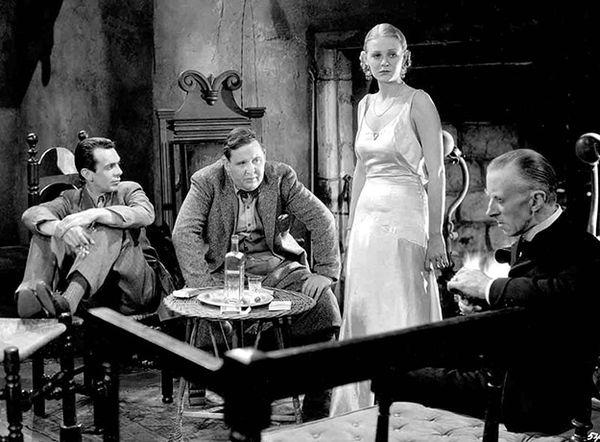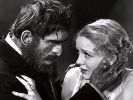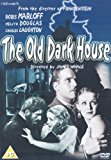Eye For Film >> Movies >> The Old Dark House (1932) Film Review
The Old Dark House
Reviewed by: Jennie Kermode

It's a dark and stormy night at the beginning of James Whale's 1932 horror comedy, a sort of Scream for the early 20th Century which nevertheless remains entertaining today. Driving down a lonely road in rural Wales, a young couple and their friend become trapped by a storm. They seek refuge in the titular house, whereupon they are confronted with a succession of horror clichés: a dangerous alcoholic butler (played by the great Boris Karloff), hints about a long-ago murder, and a pyromaniac shut away in the attic. They also have to deal with the abominable rudeness of their hostess, who makes it clear that she doesn't want them there and strongly disapproves of any woman who smiles or wears a skirt above the ankles, which makes things difficult when a chorus girl arrives with her businessman sugar daddy, a man who has a tragic tale of his own to tell.
The Old Dark House has had something of a dark and stormy history. Adored by UK audiences when it first opened, yet soundly rejected in the US, it was missing for over a decade and rediscovered only thanks to the persistence of Whale's friend and fellow horror director Curtis Harrington, who went on to arrange its restoration. Important in the context of Whale's wider work, it also has something of a cult following, owing in part to its troubles and in part to the undeniable quality of the work. It's also interesting because, although Whale is working with clichés, many of them were only established in literary form in 1932, and are presented on film here for the first time in forms that continue to be imitated to this day.

Karloff fans may be a little disappointed that the only thing the star really gets to do here is lumber around with his arms outstretched, growling and knocking things over, but then that is something he does well. Gloria Stuart is literally luminous as the married female visitor, her long, pale satin dress like a candle flame on the shadowy sets, foreshadowing Fay Wray in the following year's King Kong. Unable to find a male actor who looked elderly enough to play the family's 102-year-old patriarch, Whale brought in Elspeth Dudgeon (who also worked with him on Bride Of Frankenstein), who, though only in her sixties, had the necessary fragility about her appearance. Melvyn Douglas, however, makes a suitably square-jawed hero, and there are some nicely choreographed fight sequences (perhaps better understood if one notes that, at the time, madmen were popularly believed to have enhanced strength).
Once the film has picked up pace it rattles along nicely. It was made before the institution of the Hayes Code so seems in some ways more modern than films made ten years later. There are a number of suggestive shots of the two young female stars, and the chorus girl talks openly about her sex life, even suggesting that she move in with the hero, with no implication that she would expect him to marry her first. Thus, despite its spoof qualities, the film presents an honest take on the era and avoids patronising its audience. Many of its jokes remain on point today and the elegance of Whale's framing makes it a visual treat.
Reviewed on: 23 Apr 2018


















